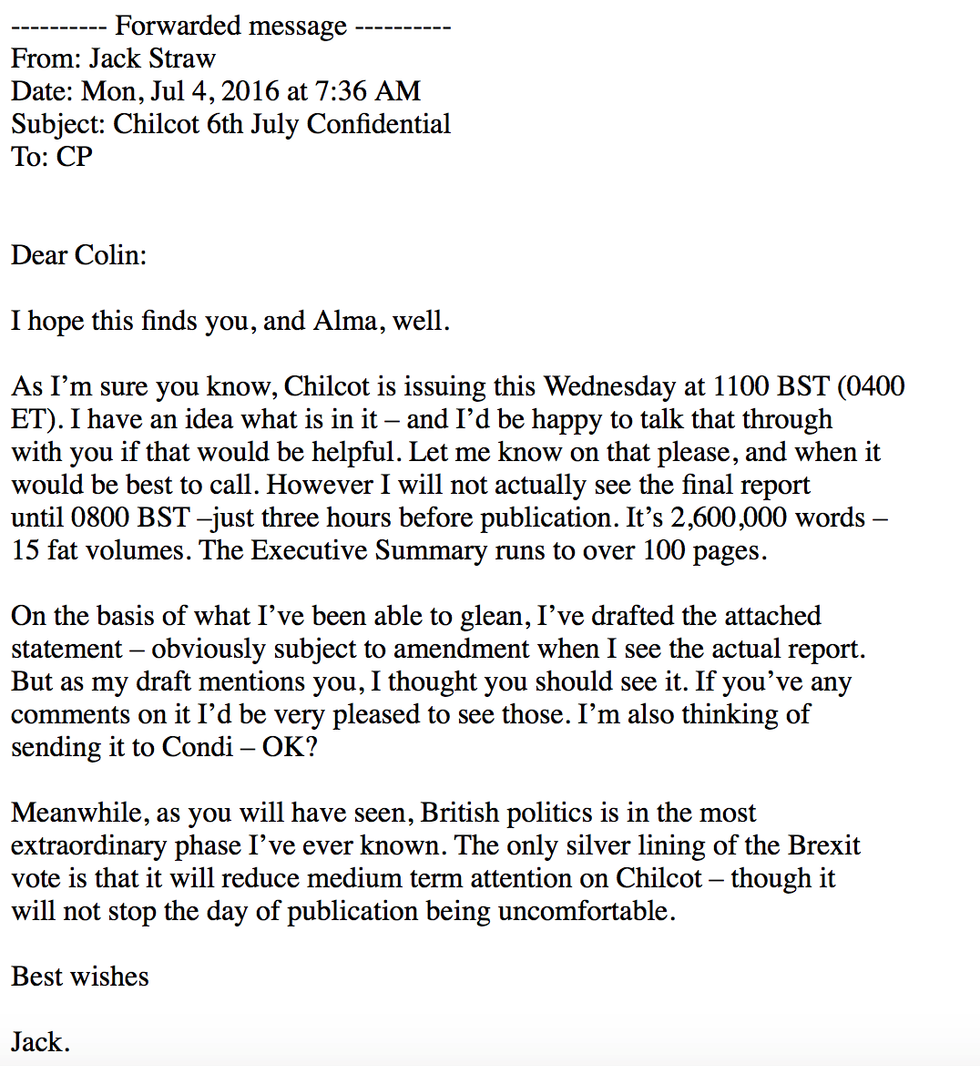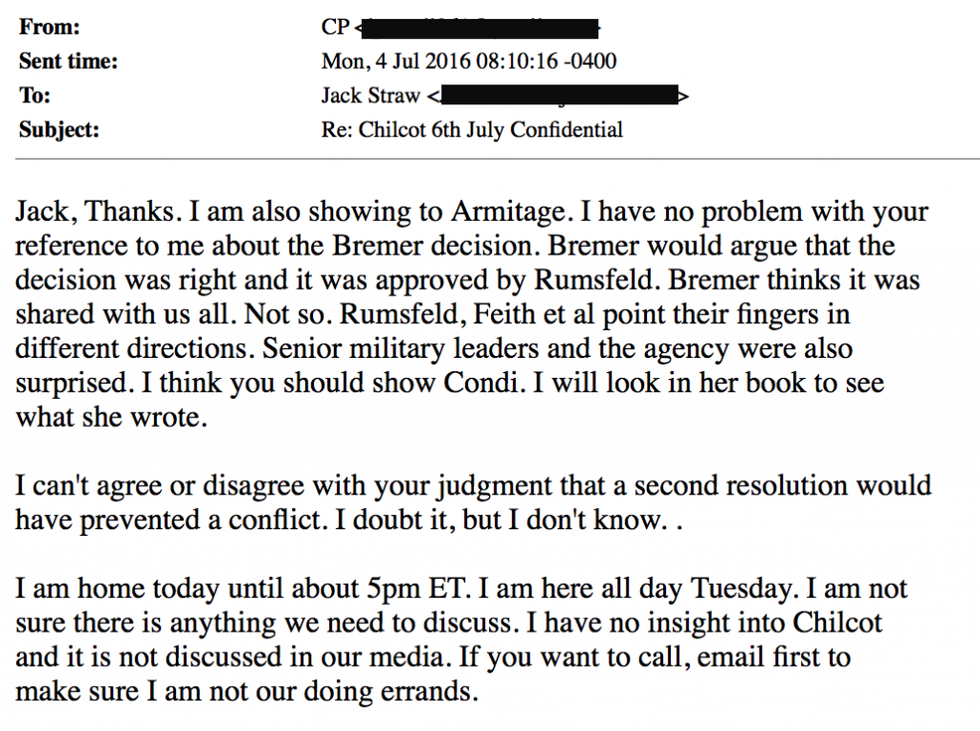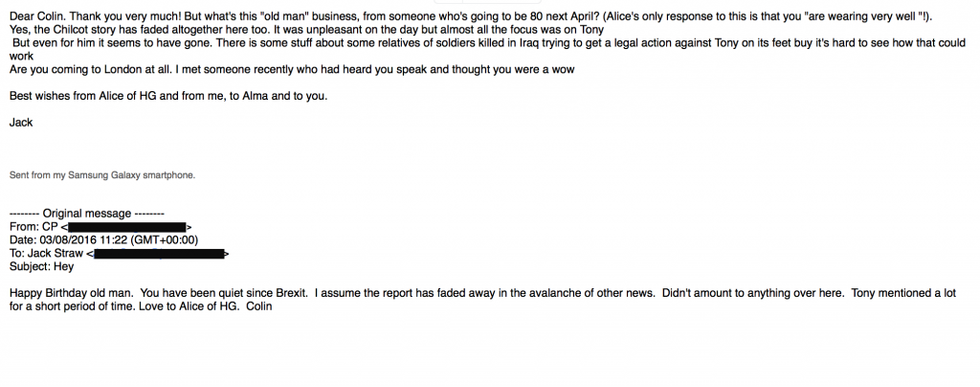
The Chilcot Inquiry criticized former British foreign secretary Jack Straw for his role in the lead-up to the invasion of Iraq. (Photo: Chatham House/flickr/cc)
To donate by check, phone, or other method, see our More Ways to Give page.

The Chilcot Inquiry criticized former British foreign secretary Jack Straw for his role in the lead-up to the invasion of Iraq. (Photo: Chatham House/flickr/cc)
Former British foreign secretary Jack Straw, a key player in the invasion of Iraq, expressed relief in July that the political brouhaha over Brexit would distract from the damning contents of the Chilcot Inquiry into the United Kingdom's role in the war.
"The only silver lining of the Brexit vote is that it will reduce medium term attention on Chilcot--though it will not stop the day of publication being uncomfortable," Straw wrote in an email to former U.S. Secretary of State Colin Powell, obtained by the hacking group DC Leaks and provided toThe Intercept and other news organizations on Tuesday.
The email, dated July 4, came two days before the release of the 2.6 million-word Chilcot Inquiry, which showed that the invasion of Iraq was decided well before all peaceful resolutions were exhausted, proving--as critics have long-contended--that the disastrous intervention was a war of choice.
The Brexit vote, in which the majority voted to leave the European Union, took place June 23.
As The Intercept reports, "In anticipation of coming [Chilcot] press coverage, Straw asked Powell to review a statement in a Word document he drafted."

Powell responded, advising Straw to share the statement with Powell's successor as secretary of state, Condoleezza Rice, and saying he would also show former Deputy Secretary of State Richard Armitage.
And, The Intercept adds:
He showed skepticism towards a part of Straw's statement which claimed that an additional United Nations resolution prior to the conflict would have avoided the invasion. He wrote back to Straw, "I can't agree or disagree with your judgement that a second resolution would have prevented conflict. I doubt it, but I don't know." (In Straw's final statement released to the press, the claim remained.)

The two men didn't correspond again for almost a month, at which point Powell emailed Straw with birthday wishes.
He noted Straw had been "quiet since Brexit" and appeared to confirm Straw's prediction, writing: "I assume the report has faded away in the avalanche of other news."
"Didn't amount to anything over here [in the United States]," Powell added.

Other emails contained in the Powell leak show the former secretary of state calling Republican presidential nominee Donald Trump a "national disgrace;" criticizing Democratic nominee Hillary Clinton and her campaign for using him to justify her use of a private email server at the State Department; and discussing former Secretary of Defense Donald Rumsfeld and his handling of the Iraq War.
Donald Trump’s attacks on democracy, justice, and a free press are escalating — putting everything we stand for at risk. We believe a better world is possible, but we can’t get there without your support. Common Dreams stands apart. We answer only to you — our readers, activists, and changemakers — not to billionaires or corporations. Our independence allows us to cover the vital stories that others won’t, spotlighting movements for peace, equality, and human rights. Right now, our work faces unprecedented challenges. Misinformation is spreading, journalists are under attack, and financial pressures are mounting. As a reader-supported, nonprofit newsroom, your support is crucial to keep this journalism alive. Whatever you can give — $10, $25, or $100 — helps us stay strong and responsive when the world needs us most. Together, we’ll continue to build the independent, courageous journalism our movement relies on. Thank you for being part of this community. |
Former British foreign secretary Jack Straw, a key player in the invasion of Iraq, expressed relief in July that the political brouhaha over Brexit would distract from the damning contents of the Chilcot Inquiry into the United Kingdom's role in the war.
"The only silver lining of the Brexit vote is that it will reduce medium term attention on Chilcot--though it will not stop the day of publication being uncomfortable," Straw wrote in an email to former U.S. Secretary of State Colin Powell, obtained by the hacking group DC Leaks and provided toThe Intercept and other news organizations on Tuesday.
The email, dated July 4, came two days before the release of the 2.6 million-word Chilcot Inquiry, which showed that the invasion of Iraq was decided well before all peaceful resolutions were exhausted, proving--as critics have long-contended--that the disastrous intervention was a war of choice.
The Brexit vote, in which the majority voted to leave the European Union, took place June 23.
As The Intercept reports, "In anticipation of coming [Chilcot] press coverage, Straw asked Powell to review a statement in a Word document he drafted."

Powell responded, advising Straw to share the statement with Powell's successor as secretary of state, Condoleezza Rice, and saying he would also show former Deputy Secretary of State Richard Armitage.
And, The Intercept adds:
He showed skepticism towards a part of Straw's statement which claimed that an additional United Nations resolution prior to the conflict would have avoided the invasion. He wrote back to Straw, "I can't agree or disagree with your judgement that a second resolution would have prevented conflict. I doubt it, but I don't know." (In Straw's final statement released to the press, the claim remained.)

The two men didn't correspond again for almost a month, at which point Powell emailed Straw with birthday wishes.
He noted Straw had been "quiet since Brexit" and appeared to confirm Straw's prediction, writing: "I assume the report has faded away in the avalanche of other news."
"Didn't amount to anything over here [in the United States]," Powell added.

Other emails contained in the Powell leak show the former secretary of state calling Republican presidential nominee Donald Trump a "national disgrace;" criticizing Democratic nominee Hillary Clinton and her campaign for using him to justify her use of a private email server at the State Department; and discussing former Secretary of Defense Donald Rumsfeld and his handling of the Iraq War.
Former British foreign secretary Jack Straw, a key player in the invasion of Iraq, expressed relief in July that the political brouhaha over Brexit would distract from the damning contents of the Chilcot Inquiry into the United Kingdom's role in the war.
"The only silver lining of the Brexit vote is that it will reduce medium term attention on Chilcot--though it will not stop the day of publication being uncomfortable," Straw wrote in an email to former U.S. Secretary of State Colin Powell, obtained by the hacking group DC Leaks and provided toThe Intercept and other news organizations on Tuesday.
The email, dated July 4, came two days before the release of the 2.6 million-word Chilcot Inquiry, which showed that the invasion of Iraq was decided well before all peaceful resolutions were exhausted, proving--as critics have long-contended--that the disastrous intervention was a war of choice.
The Brexit vote, in which the majority voted to leave the European Union, took place June 23.
As The Intercept reports, "In anticipation of coming [Chilcot] press coverage, Straw asked Powell to review a statement in a Word document he drafted."

Powell responded, advising Straw to share the statement with Powell's successor as secretary of state, Condoleezza Rice, and saying he would also show former Deputy Secretary of State Richard Armitage.
And, The Intercept adds:
He showed skepticism towards a part of Straw's statement which claimed that an additional United Nations resolution prior to the conflict would have avoided the invasion. He wrote back to Straw, "I can't agree or disagree with your judgement that a second resolution would have prevented conflict. I doubt it, but I don't know." (In Straw's final statement released to the press, the claim remained.)

The two men didn't correspond again for almost a month, at which point Powell emailed Straw with birthday wishes.
He noted Straw had been "quiet since Brexit" and appeared to confirm Straw's prediction, writing: "I assume the report has faded away in the avalanche of other news."
"Didn't amount to anything over here [in the United States]," Powell added.

Other emails contained in the Powell leak show the former secretary of state calling Republican presidential nominee Donald Trump a "national disgrace;" criticizing Democratic nominee Hillary Clinton and her campaign for using him to justify her use of a private email server at the State Department; and discussing former Secretary of Defense Donald Rumsfeld and his handling of the Iraq War.